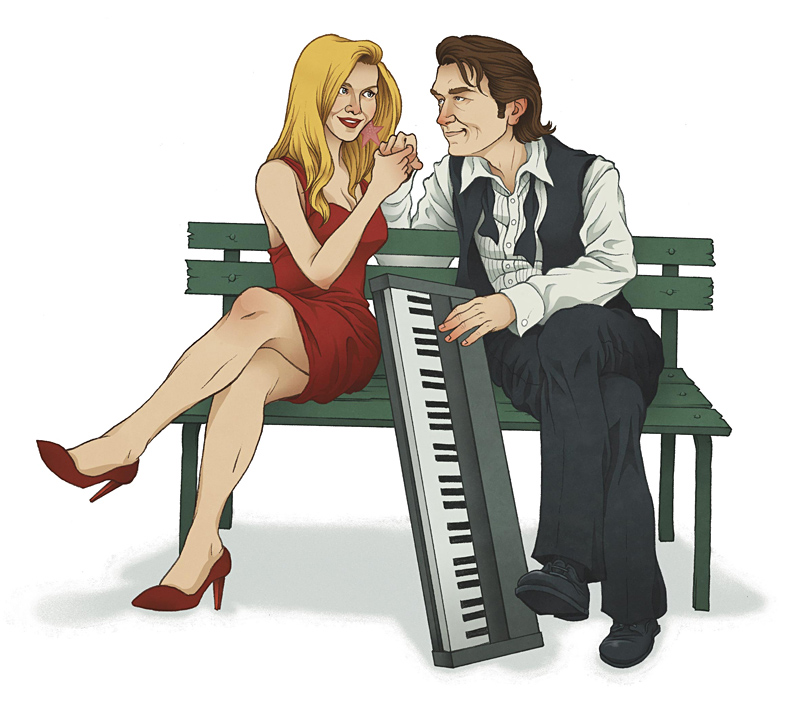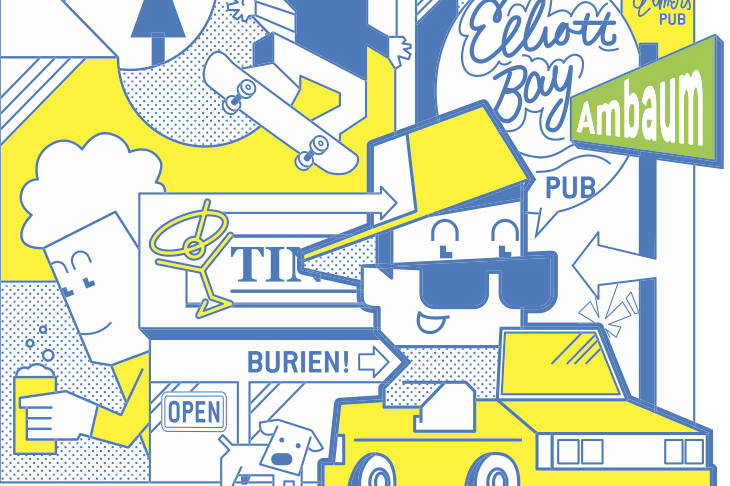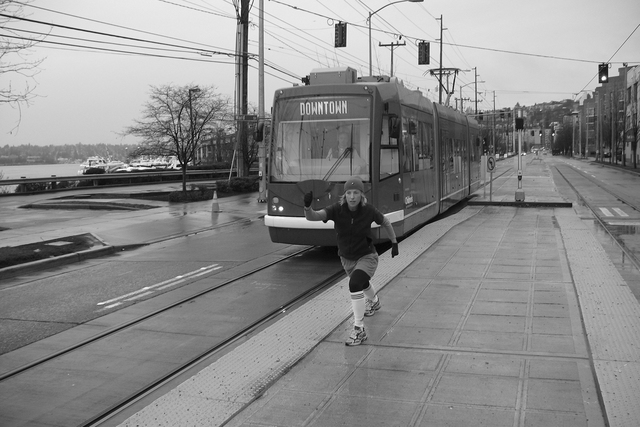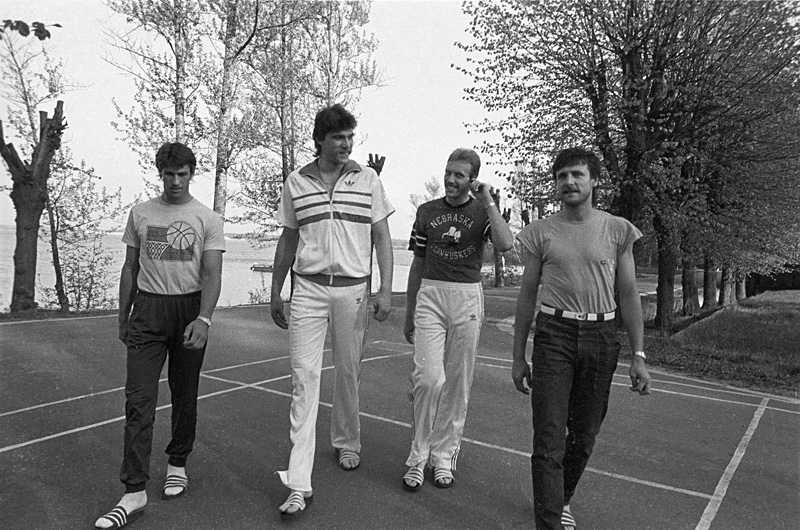The year was 1992. Nirvana, Pearl Jam, and their power-chord cohorts had made Seattle’s music scene the coolest on the planet. Microsoft stood on the vanguard of technological innovation, with the gilding of startups soon to follow. The Husky football team had just won a national championship, and the Sonics were the hottest ticket in town. Almost Live had gone national on Comedy Central, and a newspaper columnist named Dan Savage had shoved gay life out of park bathrooms and into the streets.
Hence, times were plenty heady when Cameron Crowe threw gas on Seattle’s fire with the September 1992 release of the film Singles. Crowe, a former rock journalist whose biggest cinematic splash came with Fast Times at Ridgemont High, was not exactly an interloper: He was married to Nancy Wilson of Heart, the pioneering Seattle sister act which presaged grunge. He shot the city lovingly. It didn’t just happen to be where Crowe decided to set his film; it was a character. Crowe cast Eddie Vedder, Jeff Ament, and Stone Gossard in bit roles, featured Soundgarden and Alice in Chains live (and shirtless) in clubs like Re-bar and the Crocodile, staged intense conversations at the Virginia Inn and Gas Works Park, and transformed the OK Hotel into a coffee shop where the main characters either worked or hung out.
Singles, for as much as it—and its obscenely successful soundtrack—came to represent Seattle’s zeitgeist moment, was not a film about Seattle. Its self-involved characters and lightweight story line could have been set anywhere, its edges smoothed and buffed to the point of sterility. Crowe’s Seattle is devoid of gays (on Capitol Hill!), crime, drugs (on Capitol Hill!), and ethnic minorities (with the exception of a Xavier McDaniel cameo). People occasionally drink to excess, but never smoke; all the women are redheads; and nobody ends up alone in the end. If word broke that Singles served as the secret inspiration for Friends, it should surprise no one, as Crowe’s film is essentially a 100-minute ensemble sitcom.
But that’s not to say that Hollywood failed to capture Seattle’s misty genesis. It just didn’t do so in 1992.
Released three years before Singles, The Fabulous Baker Boys depicted a Seattle that was damp, dark, and unlikely to attract Californians—or even Michiganders. It featured a pair of piano-playing brothers, portrayed by real-life siblings Jeff and Beau Bridges, forced to take on a female vocalist (Michelle Pfeiffer) to stay viable on the town’s hotel-lounge circuit.
The Bakers play standards like “Feelings” and “My Funny Valentine,” hardly anyone’s idea of cutting-edge repertoire. Yet when it comes to which film better represents the roots of modern-day Seattle and the growing pains it’s suffered two decades on, Susie Diamond and the ivory-ticklers are far grungier than Citizen Dick.
Kyra Sedgwick’s mouth is enormous—distractingly so. As with Dolly Parton’s breasts or Hugh Acheson’s unibrow, Sedgwick’s jumbo jaw distracts from her talents. When Sedgwick brushes her teeth during a pre-coital scene in Singles, you feel bad for the toothbrush.
Sedgwick also suffers from a Hollywood-specific disorder known as Dreyfuss Syndrome. Named for Richard Dreyfuss, it occurs when an actor appears as though he or she is 40 years old, no matter how old he or she actually is. When Singles was released, Sedgwick was 27—yet she looked 40. She’s 47 now, and she still looks 40. When she’s 60, she’ll look to be about 40. Only when she’s underground might she finally look her age. What’s a blessing for Sedgwick now was, for Singles, a curse.
Dwelling on Sedgwick’s looks might seem shallow, but cinema is a visual art. And if Sedgwick doesn’t appear to be a 20-something Seattleite, the film’s legitimacy is dealt a severe blow, as she and Campbell Scott, a city transportation planner who plays Sedgwick’s love interest, are the closest things Singles has to leads.
Both native New Yorkers, Sedgwick and Scott bring far too much verve to their interactions, as if whether or not world peace will be attained hinges on their enunciation of every word. Scott’s intensity has been employed shrewdly in black comedies like Roger Dodger, but casting him in a film of Singles‘ buoyancy was perilously misguided. He’s Patton’s son, for fuck’s sake.
The dynamic between Sedgwick and Scott also suffers from Crowe’s inability to write dialogue that might come out of an actual human mouth. “If I had a personal conversation with God, I would ask him to create this girl,” Scott says to a table of friends at the peak of his infatuation, shortly after he arrives unannounced at Sedgwick’s doorstep with the line “I was just nowhere near your neighborhood”—a line repeated later by Sedgwick, as Crowe hustles to neatly tie a bow around every relationship in the film. Later, when Sedgwick, an environmental advocate, comes back from an Alaskan expedition, the pair decides to just be friends. “Let’s be the first people in history to say it and really mean it,” says Scott. In a Crowe script, the whole world’s a snappy love song, with Jerry Maguire’s “You complete me” representing either the zenith or nadir of such sentimentality, depending on one’s tolerance for sap.
Aside from an awful Paul Westerberg song (“Dyslexic Heart”), Singles‘ soundtrack was a critical and commercial tour de force which outshone the film. Ever the musicologist, Crowe’s movies seem more like excuses to cobble together a killer mixtape than to produce a cohesive work of cinema. (Nowhere was this more painfully evident than in the aimless Elizabethtown, which served no greater purpose than to let Orlando Bloom take an introspective road trip while listening to a ton of Tom Petty.) When Time, cutting against the critical grain, wrote “Singles may aspire to be a Big Chill from Seattle, but it is really a fizzled St. Elmo’s Fire with rowdier music,” they had it dead right. Crowe is like a pastry chef who chose the profession simply to make shitty cookies to dunk in the milk he’s always loved.
Amazingly, Matt Dillon gives far and away Singles‘ most compelling performance, even though he’s cast as the ultimate grunge-era cliché, a long-haired rocker named Cliff with a soul patch and four jobs. In fact, he’s more believable as a rock star than the real-life rock stars who play his bandmates in Citizen Dick. Vedder and Gossard acquit themselves just fine, but Ament, tasked with coaxing Dillon away from the lips of Bridget Fonda (a tall order, granted), may never live down his infamously wooden delivery of the line “Cliff, while we’re young.” Crowe’s decision to cram his film with local hard-rock luminaries might have been well-intentioned, but to cast them in such a trifle of a movie did nothing to help their street cred, which, in Pearl Jam’s case especially, was constantly being called into question.
Throughout, Singles possesses an unfortunate obsession with gadgetry—namely garage-door openers, answering machines, and wristwatches capable of storing heaps of data. That all these gizmos have essentially been vanquished by the smartphone is fitting, as, at best, Crowe’s film stands as a frivolous time capsule of a city that, for a moment, qualified as America’s sweetheart.
The Fabulous Baker Boys opens with Jack Baker (Jeff Bridges) putting on a tuxedo in a woman’s apartment above Captain’s Vine Street Landing (now Black Bottle) in Belltown. The woman’s still in bed, naked. The sun is peeking above the water, but the water’s to the west; it is not sunrise when the pair awaken, but sunset. The woman remarks that he keeps funny hours, to which Jack replies that he holds down a “funny job.” She asks if she’ll see him again. “No,” he answers. She then tells him he looks like a creep before admitting that he has “great hands.”
For his funny job, Jack must walk from Belltown to a midtown hotel—a mile and change. The route he takes, however, is comically circuitous (a similarly roundabout route is traveled by the character Debbie Hunt in Singles). In succession, he’s shown walking by the Union Gospel Mission in Pioneer Square, the First Avenue Dejà Vu near Pike Place Market, a music store in the Denny Regrade, Il Bistro, an empty Pike Place arcade, the waterfront Ivar’s, and finally into the door of what looks to be the Sixth Avenue Hilton in the nick of time for a steady gig playing standards alongside his brother, Frank (Beau Bridges).
See also: Maps of Jack and Debbie’s strange trips through Seattle
Frank has a wife and two kids, and lives in the suburbs. His brother is clearly the more talented pianist, but Frank is the duo’s rock, booking performances and managing finances. Onstage, Frank indulges the crowd with stale banter while Jack says little, a cigarette perpetually lodged between his lips. After the show, while collecting their cash from a slimy lounge manager named Lloyd who makes it clear that they’ve just played their last gig (for the time being), Lloyd tells Jack, “If you want to smoke onstage, put on a pair of sunglasses and go play with the niggers on State Street.”
Their next gig is at a hotel tiki bar, where the patrons are more interested in watching basketball than the Bakers. The brothers have been playing together professionally for 15 years—twice that if adolescent exploits are taken into account. When they’re given their walking papers by the tiki bar’s owner, he tells Frank, “You’re class. People today, they don’t know class if it walks up and grabs them by the balls.”
On the drive home, Frank raises the specter of hiring a vocalist. “Two pianos isn’t enough anymore,” he tells his brother.
To which Jack replies, “It never was.”
Unlike Crowe’s perpetually romantic dialogue, the exchanges between the Bakers feel real; they bicker like brothers. There are instances when it’s plainly evident that they care for each other, but, more often, they can’t stand being together. They’re co-dependent, artistically frustrated, and—at least in Jack’s case—chock full of angst, a trait critical to the rise of grunge. And yet you won’t find a trace of it in Singles.
After the Bakers try out three dozen lackluster girls, Susie Diamond (Pfeiffer) shows up an hour and a half late. Frank wants to reject her for her lack of punctuality, but Jack prevails upon him to let her sing, pleading “What have we got to lose?”
Susie is cocky, a hot mess. Asked if she has any entertainment experience, she volunteers that she’s worked as a high-end escort for several years. She aces her tryout and, despite Frank’s reservations, joins the act.
While she’s been hired to mimic torch singers of yore, Susie is every bit the rock star. After forking over a wad of ones to Frank after her first performance—tips are verboten, per the elder Baker’s overbearing code—she throws her too-tight heels at the man she calls “egghead” and makes it clear that she wants equal billing on the Bakers’ lobby sandwich board. Frank obliges, and it’s soon abundantly clear that Susie is the reason the Bakers are again in demand, even in Lloyd’s lounge.
Huddling in what looks to be the Cloud Room, Susie suggests capitalizing on their reclaimed stature by demanding a cut of the bar.
“Mel Tormé doesn’t get a cut of the bar,” replies an incredulous Frank.
“Maybe he never asked,” Susie counters.
“It’s not the way we play the game,” says Frank.
“The game is changing,” interjects Jack.
Soon the trio sets off in Frank’s station wagon to play a long New Year’s weekend at a luxurious resort, where it’s revealed that Susie has never encountered a kiwi. In the middle of their first night—the night before their first performance—she awakens Frank by playing jump jazz at top volume. A masseur she’s summoned to her room accidentally knocks on the Bakers’ door. “Over here, gorgeous,” says Susie as a haggard Frank looks at her disapprovingly in the hallway.
In spite of the sleep deprivation, their first show is a success, leading to a champagne-fueled celebration back in their adjoining suites. Here, Frank gushes about his brother’s talents as a musician and dancer. “From this night forward, our lives will never be the same,” he exclaims.
Before retiring, Frank takes Susie for a spin around the balcony before beckoning Jack to do the same. “I think your little brother prefers to dance alone,” says Susie, who soon finds herself in Jack’s arms, lamenting how she’s lost her chaperone.
After the next night’s gig, Frank is summoned back to Seattle to tend to his son, who’s been injured in a bicycle accident, leaving Jack and Susie to play the final set alone. During the performance, Susie gyrates atop Jack’s piano during “Makin’ Whoopee.” And after midnight, that’s precisely what they do.
From that night forward, their lives will never be the same, but not in a way Frank—and certainly not Crowe—could have imagined.
If it doesn’t end well, it’s got to end badly, right? A day or two after they have sex, Jack and Susie are seated across a diner table from Frank, both wearing sunglasses. Susie informs Frank that they skipped “Feelings” the night he was away, which infuriates him. Jack then tells his brother to “loosen the leash.”
Later that evening, while attempting to track down Jack, Susie finds him playing in a pickup instrumental trio in a jazz club called Henry’s on Post Alley—presumably the “State Street” Lloyd referred to earlier. She heads back to Jack’s apartment and waits by his door. There, they fuck again.
The next morning, Susie informs Jack that she’s been offered steady work singing cat-food jingles, which would force her to leave the act. “Take it” is Jack’s advice, but Susie is torn. “I don’t want to leave you guys with an empty mike.”
“There’s always another girl,” replies Jack.
After her last performance with the brothers, she snaps. “You don’t give a fuck, do you, about anything?” she asks Jack.
“We fucked twice, that’s it,” he coldly replies. “Once the sweat dries up, you don’t know shit about me.”
Jack is unaware that Susie saw him playing at Henry’s, providing her the opportunity to volunteer that she spotted him “dusting off [his] dreams” in the course of branding him as a coward.
“I didn’t know whores were so philosophical,” Jack shoots back.
“At least my brother’s not my pimp,” says Susie, getting the last word in.
As pimps go, Frank does the equivalent of sending Jack to the corner of Aurora and 130th in the snow by booking a 3 a.m. charity telethon appearance on a public-access station. Jack explodes on-air (not that anyone’s watching) and beats the crap out of his brother after Frank sarcastically chides him for being “so hip, so cool, so sure he’s better than everyone else.”
Soon Jack is back at Henry’s, where he accepts an offer to play every Tuesday and Thursday. Showing up in his brother’s garage, he breaks the news to Frank, who clearly sees it coming. Jack then appears in front of Susie’s apartment in the morning as she’s heading out to her jingle job.
“So did you find yourself another girl?” she asks him.
“I didn’t look,” Jack replies. “Am I gonna see you again?”
“What do you think?” says Susie.
“Yeah, I think I’m gonna see you,” responds Jack. “Intuition.”
Had Crowe helmed this film, Susie and Jack would have embraced wildly in the middle of the street and perhaps made a beeline for the Justice of the Peace. But life’s often more ambiguous and disappointing than that. The dynamic among the Bakers and Susie is infinitely truer than anything in Singles, where the closest Citizen Dick gets to communion is watching a documentary on bees together while presumably stoned (we don’t know, because Crowe just says no). While Frank is the weak link musically, his struggle to maintain a career in the arts while ensuring his family’s security is one many a musician—irrespective of genre—has had to grapple with. Susie, who’s never held a 9-to-5, jumps at the opportunity to shore up her footing, while Jack can only begin to realize his full potential when the net’s pulled out from under him. He’s left with nothing but his craft to liberate himself: often the scariest of places from which genius—and fame—emerges. That Jack’s seated on a piano bench instead of wielding a Stratocaster is beside the point.
The year is 2012. Seattle’s signature sound is either Caucasian rap or Crosby, Stills, & Nashville beard-folk. Soundgarden just reunited, and Pearl Jam’s still going strong. Microsoft is a bureaucratic megalith consistently chastised for its inability to innovate. For the Husky football team, mediocrity is an achievement. The Sonics are now playing in Oklahoma City, with a doofus mayor and Lilliputian hedge-fund manager trying to revive the team’s corpse down in SoDo. Almost Live is long gone, although, as with pro basketball, a reanimation effort is afoot. And Dan Savage is a monogamish dad, hoping to be afflicted with Dreyfuss Syndrome.
Seattle is no longer America’s sweetheart. Instead, it sneers with envy at Portland, which has inspired its own IFC sketch- comedy show and is clearly where up-and-coming Northwest musicians prefer to call home nowadays. There, the roses are in bloom, the possibilities endless. Here, it might be time to head back to State Street and improvise, because what have we got to lose?








